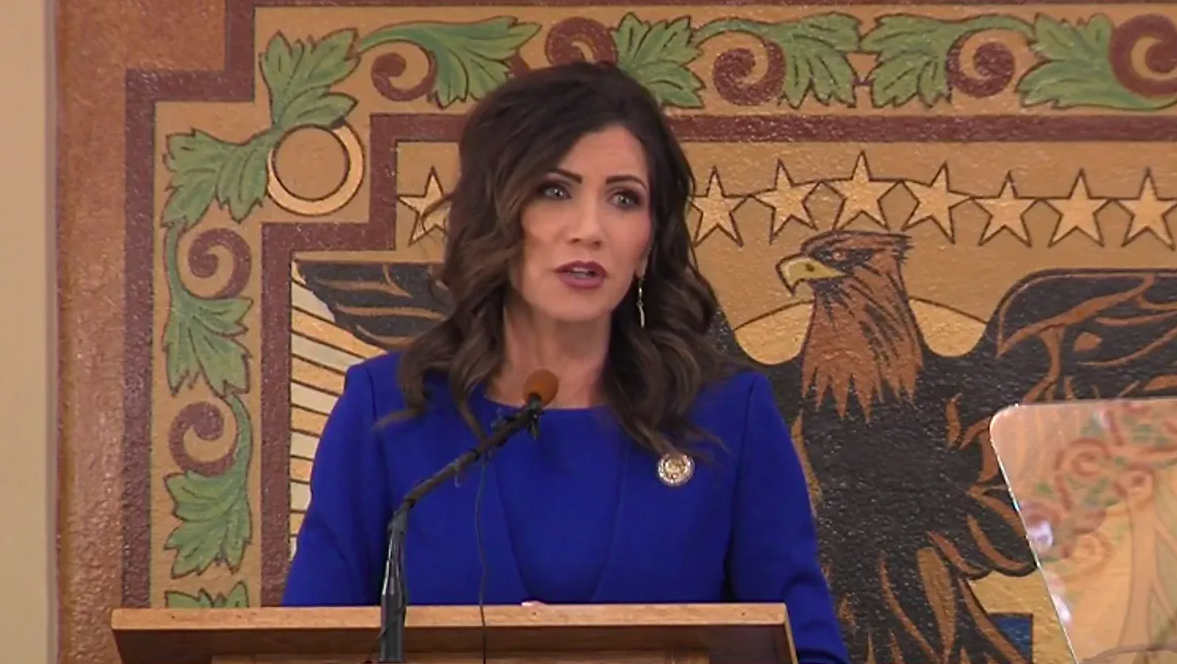Image via
Last November, South Dakota became the first US state to simultaneously legalize medical and adult-use cannabis at the same time by way of a voter-approved ballot initiative. But rather than allowing the Mount Rushmore state to take its rightful place in history, Governor Kristi Noem is working to help local cops overturn the will of the state’s voters.
On Election Day, 54 percent of voters approved Amendment A, an initiative that legalizes cannabis through an amendment to the state constitution. Shortly after this amendment was approved, state Highway Patrol Superintendent Col. Rick Miller and Pennington County Sheriff Kevin Thom filed a legal challenge arguing that it violated state rules against amending more than one subject at a time.
Amendment A legalizes cannabis possession, home-grows, and personal use for adults over 21-years-old; sets up a framework for taxed and regulated retail sales; ensures access to medical marijuana; and requires the state to pass industrial hemp regulations. The legal challenge argues that this amendment violates the state’s single-subject law by trying to change too many things at once.
The cops who filed the challenge are arguing this initiative should be considered a “revision” to the state constitution, not an amendment. Under state law, a revision is a fundamental change to the constitution, which can only be enacted with support from three-quarters of lawmakers from each chamber of the state legislature. And since most of these politicians are fervent prohibitionists, it is pretty much guaranteed that this change would never be approved.
Last week, Governor Kristi Noem joined the battle to overturn the will of her voters by issuing an executive order to facilitate the cops’ legal challenge. In the order, the governor said that she specifically directed the cops to launch the litigation on her behalf. Noem’s support of the legal challenge should come as no surprise, considering that she actively advocated against Amendment A prior to the election.
“It does seem like an attempt to either suppress the voices of voters or to tell voters that they don’t know what’s best, that the government knows what’s best for them,” said Libby Skarin, campaign director of the ACLU of South Dakota, to the Public News Service. The cannabis advocates who helped draft the initiative plan to fight the challenge, arguing that the amendment only addresses one single subject: cannabis legalization.
“These are cynical attempts to undermine the democratic process,” said NORML State Policies Coordinator Carly Wolf in a statement. “Legalization opponents have shown time and time again that they cannot succeed in either the court of public opinion or at the ballot box. Thus, they are now asking judges to set aside the votes of over a million Americans in a desperate effort to override undisputed election outcomes. Whether or not one supports marijuana legalization, Americans should be outraged at these overtly undemocratic tactics.”
South Dakota’s medical cannabis initiative, which was supported by nearly 70 percent of voters, is not being challenged. But without the additional constitutional protections offered by Amendment A, lawmakers would be able to interfere with the rollout of this program.
Other conservative states are also working to overturn cannabis reform measures approved by their voters last fall. Prohibitionists in Montana are also suing to have the courts strike down the state’s new adult-use law, which was supported by 57 percent of voters. And in Mississippi, politicians are trying to strike down the state’s new medical marijuana program.











